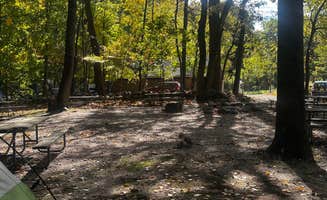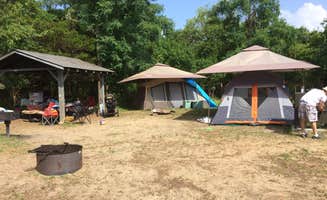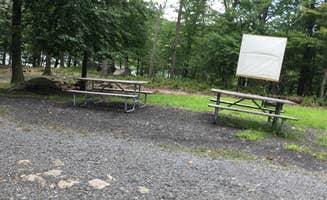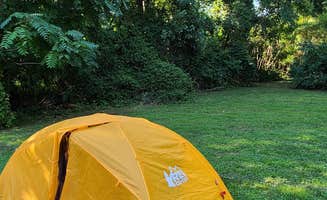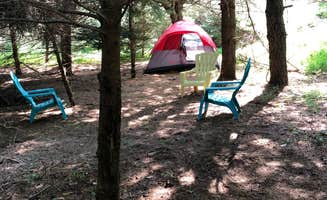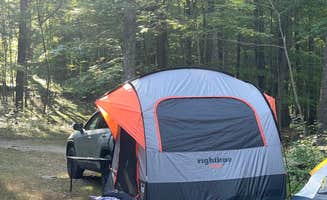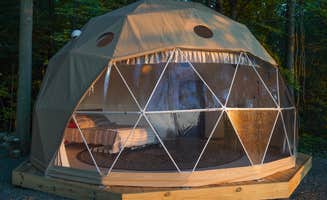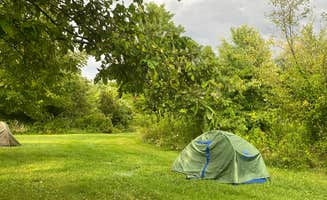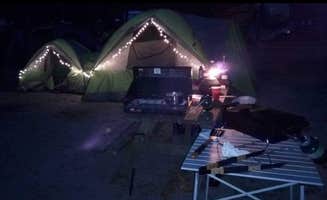Tent camping near New York City offers primitive camping experiences with varying levels of seclusion and access difficulty. Sites range from 45 minutes to 2 hours from the city, with elevations up to 1,300 feet in some locations. Most primitive sites require campers to filter water from nearby streams or bring their own, especially at more remote locations away from established facilities.
What to do
Paddle on reservoirs: Round Valley State Park Campground offers excellent water activities for primitive campers. "This is hike-in or canoe-in only. I'd opt for canoeing for the most enjoyment. It's very secluded once arriving to a campsite," says one visitor. The reservoir has crystal clear water ideal for paddling and swimming.
Explore military history: Camp Gateway Staten Island provides a unique urban camping experience with historical elements. "There are abandoned buildings here and you can do urban exploring. There are rangers taking you on a trek and exploring the abandoned building," notes one camper. The site offers views of the Narrow bridge and city lights rather than stars.
Winter recreation: Ward Pound Ridge Reservation remains open year-round and transforms during winter months. "Ward Pound Ridge is very well known to the locals as a great place for sled-riding in winter (Pell Hill area) and a place for big group gatherings," explains a regular visitor. The reservation's varied terrain makes it suitable for all-season camping.
What campers like
Natural water access: Stonetown Circular trail Primitive #1 provides more rugged camping approximately 2 miles into an 11-mile loop trail. "This is a great spot to set up camp because it has a wide area and an amazing view. You will find the site right next to the American Flag at the top of the mountain," notes a hiker. The site requires navigating a challenging rock scramble, so packing light is advisable.
Wildlife encounters: The Stephen & Betsy Corman AMC Harriman Outdoor Center offers tent platforms that provide protection from rain and ground moisture. "The lake is very peaceful, and home to beavers we watched from the dining hall patio," says one camper. The center is accessible via public transportation, with a shuttle service from Tuxedo Park Train Station.
Solitude without distance: While most remote sites require significant hiking, Campgaw Mountain Reservation offers a different experience. "Once the sun goes down, the campsite becomes a ghost town (except for the odd sheriff driving down the road). We went on a holiday weekend, and we were the only campsite that was occupied," reports a camper. The trade-off is proximity to popular hiking trails that run through the camping area.
What you should know
Reservation systems vary: Many primitive camping areas require in-person booking. "There is no phone or internet reservations and has to be made in person at the office. I would recommend call earlier and come in few minutes earlier to 9 am when the office opens to find the best spots," advises a camper at Ward Pound Ridge Reservation.
Fire regulations: Rules about fires differ significantly between sites. Battle Row Campground has strict requirements: "There are NO fire pits, you must bring your own. Fires are allowed but you must have a fire container or bucket for your fire off of the ground," explains a camper. Sites have raised BBQ pits for cooking only.
Access limitations: Vehicle access varies widely. At Sandy Hook, "No cars are permitted in the campground, so you will have to lug your gear to your spot so choose wisely my friends!" warns one reviewer. Other sites require hiking several miles with all gear, particularly at Round Valley where sites are at least 3 miles from parking areas.
Tips for camping with families
Playground access: Croton Point Park offers family-friendly amenities including a playground visible from campsites. "Peaceful and gorgeous campsite, with plenty of space between sites. Great view of the Hudson, and playground within sight of our camper," notes a visitor. The park occupies a peninsula on the Hudson River with varied terrain.
Rental options: For families not ready for tent camping, Sebago Cabin Camp provides alternatives. "These cabins are VERY rustic, four walls, a cot, and a fridge. You still feel like you are 'roughing it' but with the convenience of a fridge," explains a camper. The cabins lack plumbing and heat but provide more structure than tents.
Wildlife precautions: Teach children about proper food storage, especially in raccoon-heavy areas. "Sites also have metal storage units for locking up foodstuffs to protect them from being pilfered by the numerous and bold raccoons," mentions a camper at Sandy Hook. Some campers recommend dry bags for additional protection.
Tips from RVers
Limited hookups: Battle Row Campground provides basic amenities for RVers. "The sites have provided electric and water and are kept so clean. They have shower and restroom facilities, the showers were amazing and also so clean!" reports an RV camper. However, there are no sanitary dump stations on site.
Site selection strategy: For RVs at Croton Point Park, request sites away from the train depot. "Only down side is there is a train depot right outside and you can hear them shunting trains all night," notes a reviewer. The park layout places tent sites after RV sites, creating different noise and traffic patterns.
Off-season advantages: Several campgrounds remain open year-round with fewer restrictions during off-peak times. For RVers seeking more space, avoiding summer weekends is recommended as primitive tent campers often spread into RV areas during peak season at many facilities.


